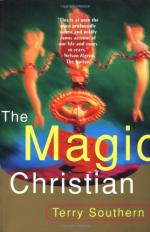|
This section contains 220 words (approx. 1 page at 300 words per page) |
Texas-born writer Terry Southern is best remembered for the wildly written satires—usually featuring a Candide-esque heroine—that earned him acclaim in the early 1960s. Southern also cut a wide swathe through the 1960s film world. His writing on Dr. Strangelove (1964) and Easy Rider (1969) earned him two Academy Award nominations and helped define the rebelliousness and paranoia of that era. But by all accounts, Southern's exposure to Hollywood had an unwholesome effect. By 1970, his fictional output had slowed to a trickle. What he did publish belied the promise of his early work. Silent for the next two decades, in 1992 he published Texas Summer, a poorly received autobiographical novel. At his death he left behind more than 40 unproduced screenplays and an unpublished spoof of Virgin Records, titled Virgin. While many found his writing sophomoric, Southern had a special gift for unmasking hypocrisy, and while he used it, he was among the funniest writers working.
Further Reading:
McAninch, Jerry. "Terry Southern." In Dictionary of Literary Biography. Volume 2. American Novelists Since World War II, edited by Jeffrey Helterman and Richard Layman. Detroit, Gale Research Company, 1978.
Murray, D. M. "Candy Christian as a Pop-Art Daisy Miller." Journal of Popular Culture. Vol. 5, 1971, 340-48.
Silva, Edward T. "From Candide to Candy : Love's Labor Lost."Journal of Popular Culture. Vol. 8, 1974, 783-91.
|
This section contains 220 words (approx. 1 page at 300 words per page) |


